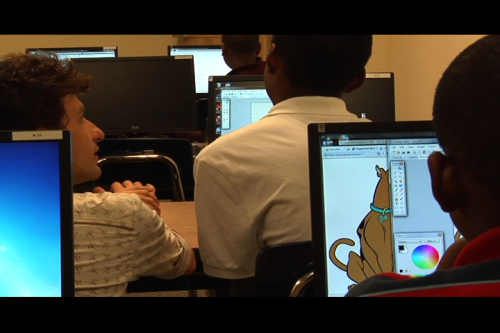NBC10 in Philadelphia brought a news camera to visit the Powerful Voices for Kids program this summer and discovered that children are taking flash mobs very seriously. But what children discovered was that television news is not a window on the world. Because of the speed and brevity of the reporting process, inaccuracies and distortions occur. Many voices and points of view are omitted.
 As part of the Powerful Voices for
Kids program at the Russell Byers Charter School, a group of fourth, fifth, and
sixth graders have been learning about the power of social media, which they
recognize as a tool that can be used for good and bad.
As part of the Powerful Voices for
Kids program at the Russell Byers Charter School, a group of fourth, fifth, and
sixth graders have been learning about the power of social media, which they
recognize as a tool that can be used for good and bad.
Powerful Voices for Kids instructor John Landis is one of 13 instructors in the program who has been exploring news and current events in relation to digital media and technology. After reading articles about recent events in Philadelphia and Washington DC, Landis said, “Students reflected on choices made by flash mob initiators. They also considered the decisions made by the participants and the police, and explored the choices made by newspapers and TV news in covering the event.” As part of this project, children are make simple videogames to depict the choices and consequences of flash mobs, using an online videogame production tool easy enough for children to use. Stay tuned to this space as we will be chronicling how the children react and respond to the news story about them and how instuctor John Landis uses the many teachable moments that surrond this experience.
More
than 85 children from 41 neighborhoods in Philadelphia are participating in the
Powerful Voices for Kids program, which has launched its second year as a program of the Media Education Lab at Temple University. From July 5 –
30, kindergarten through 8th grade students are beginning to look
analytically at the messages of mass media, popular culture, and digital
media. They also get to create
their own media messages, which include comics, radio programs, video
documentaries, stories, advertisements, and even videogames. For example,
students are responding to celebrity culture narratives about fame, using the
case of athlete LeBron James to explore how teens talked back to the media by
sharing their opinions about his career choices.
“Children
today have cell phones and they are active media consumers, spending more than
10 hours per day with screen media. As a result, they get a lot of complex and
often conflicting messages from contemporary media and technology,” said Renee
Hobbs, the director of the Powerful Voices for Kids program and a professor at
Temple University’s School of Communications and Theater. “The program is
designed to strengthen children's abilities to think for themselves,
communicate effectively using language and technology tools, and use their
powerful voices to contribute to the quality of life in their families, their
schools, their communities, and the world.”
Educators got into the act as well. During
the week of July 19 – 23, more than 70 educators from across Philadelphia and
around the nation attended the OPEN DOORS PROGRAM, a staff development
workshop where teachers learn how to bring Powerful Voices for Kids to their
own schools and communities. An online community documents their experiences here. Powerful
Voices for Kids is supported by a grant from the Wyncote Foundation, the Verizon Foundation and the Byerschool Foundation.